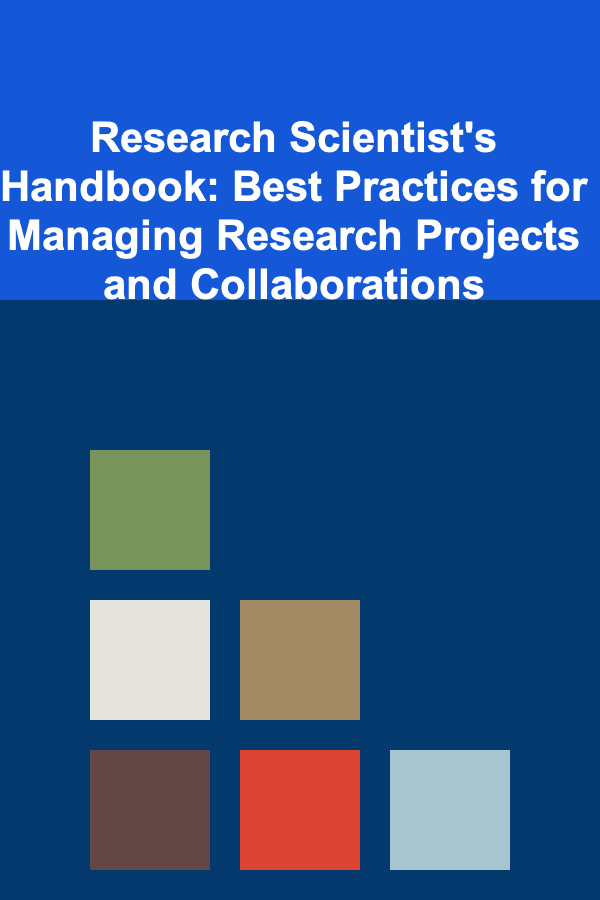
Research Scientist's Handbook: Best Practices for Managing Research Projects and Collaborations
ebook include PDF & Audio bundle (Micro Guide)
$12.99$9.99
Limited Time Offer! Order within the next:

In the fast-paced world of scientific research, effective management of projects and collaborations is as critical as technical expertise. As research scientists, we often find ourselves juggling multiple projects, managing tight deadlines, and collaborating with diverse teams. The success of your research is not just determined by the quality of your data or the novelty of your findings, but by how well you navigate the complexities of project management and team dynamics.
This guide offers actionable insights into best practices for managing research projects and collaborations. It covers essential topics such as project planning, collaboration strategies, conflict resolution, and effective communication---tools that will help you maximize productivity, foster meaningful partnerships, and ensure your research achieves its intended outcomes.
Project Planning: Laying the Foundation for Success
Effective research begins long before you collect data or write a paper. The planning phase is critical to ensuring that your project is well-structured, stays on track, and yields reliable, impactful results. Research projects can be complex and multifaceted, so a strong foundation in project management can make all the difference.
Actionable Steps:
- Set Clear Objectives: At the outset, define clear, measurable research goals. Break these goals down into smaller, achievable milestones. Whether it's developing a new methodology, answering a specific scientific question, or proving a hypothesis, having well-defined objectives will keep your project focused.
- Develop a Timeline: Create a realistic timeline that outlines key milestones and deadlines. Consider the scope of your project, available resources, and potential setbacks. Project management tools like Trello , Asana , or Microsoft Project can help you track progress and ensure deadlines are met.
- Identify Resources and Requirements: Assess the resources you need to complete your project. This includes funding, equipment, laboratory space, and personnel. Ensure that you have the necessary tools in place before you begin. Anticipating resource needs early can prevent delays down the line.
- Risk Management: Identify potential risks that might impact your project, such as unforeseen technical challenges or changes in funding. Develop contingency plans to mitigate these risks, allowing you to pivot if necessary without losing momentum.
Structuring and Managing Collaborations
Science is increasingly interdisciplinary, and research today is often a collaborative effort. Working with colleagues, external collaborators, and institutions can expand your capabilities, access new expertise, and accelerate the pace of discovery. However, successful collaborations require careful management and clear communication.
Actionable Steps:
- Choose Collaborators Wisely: Select collaborators who bring complementary skills and expertise to the table. A great collaborator is not just someone with technical expertise, but someone who shares your vision for the project and is committed to its success. Consider personality and working style to ensure smooth interactions.
- Establish Roles and Responsibilities Early: Clearly define each team member's role, responsibilities, and expectations. This will reduce the risk of misunderstandings and ensure that everyone is aligned from the outset. A well-structured team can move faster and more efficiently, with less overlap or gaps in the work.
- Develop a Memorandum of Understanding (MOU): If working with external collaborators or organizations, formalize your agreements through an MOU or a collaboration agreement. This document should cover intellectual property rights, publication rights, resource sharing, and authorship order. It sets clear guidelines and avoids conflicts later on.
- Foster Open Communication: Establish regular communication channels to keep everyone updated on project progress. Weekly meetings, email updates, and collaborative platforms like Slack or Google Drive can help ensure seamless information sharing. Transparency in communication helps identify problems early and ensures everyone is on the same page.
- Be Ready to Manage Conflict: Disagreements can arise in any collaboration, especially when working with a diverse group of scientists. Develop conflict-resolution strategies that emphasize respect, constructive feedback, and compromise. Understand that differing perspectives often lead to better outcomes, but ensure that issues are addressed promptly to avoid project delays.
Effective Time Management for Research
Managing time effectively is one of the most important skills for a research scientist. Research can be unpredictable, and you may find yourself pulled in multiple directions---writing papers, conducting experiments, attending conferences, and managing collaborations. Without good time management, it can be easy to lose focus or fall behind schedule.
Actionable Steps:
- Prioritize Tasks: Use tools like the Eisenhower Matrix to determine which tasks are urgent and important, and which can be delegated or postponed. Focus on the activities that directly contribute to advancing your research goals, and leave less critical tasks for later.
- Set Daily and Weekly Goals: Break your larger project into smaller, manageable tasks that can be completed in short timeframes. Each day or week, identify key tasks to accomplish, whether it's running experiments, analyzing data, or writing sections of a paper. Setting small, achievable goals helps maintain momentum.
- Use Time-Blocking: Time-blocking is a technique where you allocate specific time slots to specific tasks. For example, you might block off 9--11 AM for data analysis, 11 AM--12 PM for email correspondence, and 1--3 PM for experimental work. This helps you stay focused and minimizes distractions.
- Minimize Interruptions: Identify and minimize distractions to improve productivity. Set aside specific times for checking emails, responding to messages, and attending meetings. During focused work times, mute notifications and dedicate your attention entirely to the task at hand.
Managing Data and Documentation
In research, data management is not just about collecting numbers; it's about ensuring that your data is organized, accessible, and reproducible. Good documentation practices are key for managing data effectively and ensuring that your findings are credible and can be built upon by others.
Actionable Steps:
- Implement a Data Management Plan (DMP): Develop a clear data management plan that includes strategies for data collection, storage, organization, and sharing. Make sure your data is stored in an organized and easily accessible way, using systems like LabArchives , Dropbox , or Google Drive.
- Ensure Reproducibility: Document your experimental methods and data collection procedures in detail so others can replicate your work. This includes keeping track of reagents, equipment calibration, software versions, and protocols.
- Follow Data Privacy and Security Guidelines: If your research involves sensitive data, such as human subjects or proprietary information, ensure that your data management practices comply with relevant privacy laws and ethical guidelines.
- Regular Backups: Data loss can derail an entire research project. Make sure to back up your data regularly, both locally and on cloud storage platforms, to prevent the loss of critical information.
Maximizing Research Dissemination and Impact
Sharing your research findings with the scientific community and beyond is essential for maximizing their impact. Whether you're publishing papers, presenting at conferences, or engaging with the public, how you disseminate your work plays a crucial role in its reach and influence.
Actionable Steps:
- Select the Right Journals for Publication: Choose journals that align with your research field and target audience. Consider factors such as journal impact factor, audience reach, and publication speed when deciding where to submit your papers.
- Create a Strategic Publication Plan: Plan your publications ahead of time, especially if you're working on multiple projects. Determine when to publish, what data to include, and the appropriate co-authors for each paper.
- Engage with the Broader Community: In addition to academic publications, consider engaging with broader audiences through blogs, podcasts, or media outlets. Communicating your research to the public helps increase its visibility and societal impact.
- Collaborate on Reviews and Commentaries: Contributing to review articles or commentaries in your field is an excellent way to establish yourself as a thought leader and to discuss the broader implications of your work.
Navigating Challenges and Maintaining Resilience
Research is not always smooth sailing. From experimental setbacks to funding shortages, you will inevitably face challenges. Resilience and the ability to adapt are key traits of successful research scientists.
Actionable Steps:
- Stay Focused on the Bigger Picture: When faced with setbacks, remind yourself of the bigger goals and the long-term impact of your work. This will help you stay motivated and focused on overcoming obstacles.
- Build a Support Network: Having a strong support network of colleagues, mentors, and collaborators can help you weather challenges. Lean on them for advice, encouragement, and perspective when things get tough.
- Practice Self-Care: Research can be mentally and physically demanding. Take time to rest, exercise, and engage in activities outside of work to maintain your overall well-being. Burnout can derail even the best-laid plans, so prioritize your health.
Conclusion
Managing research projects and collaborations is a multifaceted skill set that requires a balance of planning, communication, time management, and resilience. By implementing the best practices outlined in this guide, you can navigate the complexities of research with confidence, build strong partnerships, and ensure that your work makes a lasting impact. Ultimately, the success of your research project is determined not only by the science you produce but also by how effectively you manage the process of getting there.
Reading More From Our Other Websites
- [Metal Stamping Tip 101] Understanding the Hidden Costs Behind Metal Stamping Quotes
- [Organization Tip 101] How to Use Under-Sink Storage for Bathroom Organization
- [Home Pet Care 101] How to Prevent Fleas and Ticks in Your Home and Pet
- [Rock Climbing Tip 101] Innovative Climbing Accessories You Didn't Know You Needed
- [Personal Care Tips 101] How to Choose a Razor for Different Hair Thickness and Growth
- [Home Lighting 101] How to Determine the Best Wattage When Choosing the Right Light Bulb for Your Fixtures
- [Home Budget 101] How to Budget for Home Improvement Projects Without Breaking the Bank
- [Personal Investment 101] How to Invest in Real Estate Without a Large Down Payment
- [Organization Tip 101] How to Choose the Right Containers for Potted Plants
- [Home Budget Decorating 101] How to Maximize Your Decorating Budget: A Step-by-Step Guide to Planning and Prioritizing

How to Build a Lasting Relationship with Trusted Pet Carers
Read More
How to Conduct Market Research for Your New Business
Read More
How To Learn to Play Jazz Standards on Guitar
Read More
How to Use Trello for Twitch Stream Planning
Read More
10 Tips for Photographing Your Toy Collection for Online Sales
Read More
10 Tips for Customizing Printable Masks with Paint and Embellishments
Read MoreOther Products

How to Build a Lasting Relationship with Trusted Pet Carers
Read More
How to Conduct Market Research for Your New Business
Read More
How To Learn to Play Jazz Standards on Guitar
Read More
How to Use Trello for Twitch Stream Planning
Read More
10 Tips for Photographing Your Toy Collection for Online Sales
Read More